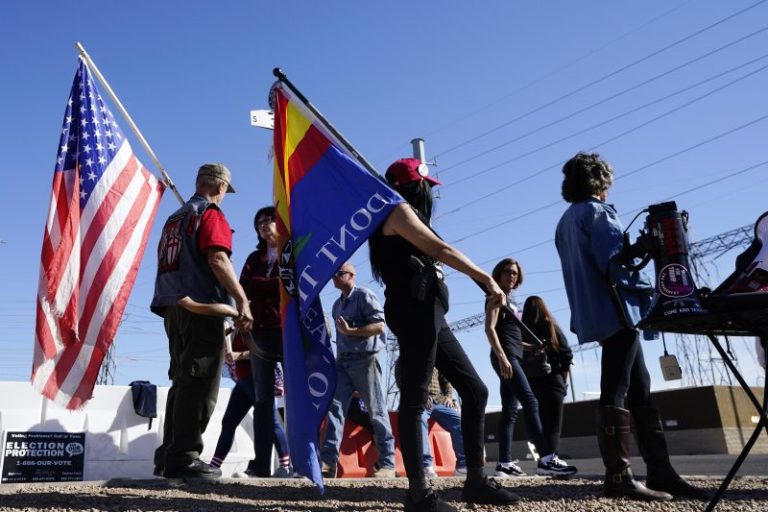At first glance, the brouhaha in Arizona’s Maricopa County seems to be very specifically focused on problems that emerged in polling places during the midterm elections earlier this month. The office of outgoing Attorney General Mark Brnovich (R) wrote a letter to county officials asking a number of largely mechanical questions about printer settings and procedures for handling voters, the sorts of things that might generally be items somewhere near the bottom of a committee meeting in some municipal government office.
But that letter and the broader effort to undercut confidence in the results in this one particular county are neither fundamentally procedural nor constrained in scope. Instead, the county is once again a target of widespread Republican backlash primarily because the county, once again, is the reason a particularly aggressive state Republican Party suffered unexpected electoral losses.
To some extent, that the aftermath of the midterms saw a Republican campaign aggressively challenging county officials — to the point that officials perceived one attorney’s comments as a veiled threat — is simply a predictable evolution of what’s been happening in the state. After Arizona voted for Joe Biden in 2020, the state party, helmed by far-right chair Kelli Ward, embraced conspiracy theories about the results. When a leader in the “Stop the Steal” movement said he was “willing to give his life” for that effort in December 2020, the state party shared a message with its Twitter followers: “He is. Are you?” The riot at the Capitol came less than a month later.
But that was by no means the extent of the effort. A lengthy, expensive and futile “audit” of the Maricopa County results didn’t change any results, but did gin up more (quickly debunked) speculation about purportedly suspicious irregularities in the vote. The soil was fertile for candidates who viewed the 2020 results as suspect to fare well in party primaries, and, sure enough, the 2022 slate of Republican candidates for state officials was a who’s who of people who claimed the 2020 results were suspect. Kari Lake for governor. Blake Masters for Senate. Mark Finchem for secretary of state. Abe Hamadeh for attorney general.
And then, after winning their primaries in part on the strength of their fealty to the idea that 2020 was corrupt, each either lost their general-election bids or trail by margins that will be difficult to overcome. And in each case, they lost Maricopa County.
It’s important to recognize how Maricopa County specifically has driven the GOP’s failures in recent years. For decades, Arizona voted Republican in presidential contests, generally because both the state’s largest county voted Republican (Maricopa has provided a majority of the state’s votes in every presidential contest over the past 60 years) and because the rest of the state did, too. When there was a break between Maricopa and the state’s other counties before 2020, it was generally that Maricopa was more Republican than the rest of Arizona.
Then came 2020.
Take Maricopa out of the mix and Donald Trump wins Arizona in 2020. Take Maricopa out of the mix and Kari Lake wins the governor’s race. So: Why not try to take Maricopa County out of the mix? Why not push legal resources and executive power, where applicable, into the breach?
Interestingly, Maricopa is not responsible for all of the GOP’s failures in the midterms. In both the Senate race, where incumbent Sen. Mark Kelly (D) won reelection, and in the secretary of state’s race, the rest of Arizona voted for the Democrat as well. That suggests that the campaigns of Masters and Finchem were rejected more broadly than by the 3 in 5 Arizona voters who live in Maricopa County. Nor was the county hostile to Republicans: State treasurer candidate Kimberly Yee won easily.
There wasn’t even much drop-off in Yee’s race. In other words, this wasn’t simply Yee prevailing in Maricopa County because Democrats who turned out to reject Lake and Finchem didn’t bother to vote in the treasurer’s race. This was people voting Democratic and then Republican when they came to a Republican who, as it happens, wasn’t dedicated to rejecting the results of the 2020 election.
Which is to say: the results in Maricopa County! That’s important context here. This was not only a rejection of election deniers, as the term has it. It was a rejection by voters in a county where the deniers had explicitly sought to have presidential votes thrown out.
That Maricopa County is more blue than the rest of the state isn’t really surprising. It is the only large urban county in Arizona, which consistently correlates to heavily Democratic voting. Conspiracy theories often center on Democratic cities in part thanks to the subtext of race and class, but also because Democratic dominance is often foreign elsewhere. It’s not really surprising that residents of the state’s counties might find it baffling that Maricopa County has been so close when their own results have skewed so much more heavily Republican. In 2020, the average margin outside of Maricopa County was 28 points, the highest since 1960.
Asked earlier this year whether he’d certify a Democratic win in 2024 should he win election as secretary of state, Finchem insisted that wouldn’t happen, in part because he didn’t know anyone who’d voted for Biden in the first place. For him and others in his party, the idea that Maricopa would be trending blue simply seems impossible. And if you view it as impossible, you may think there’s fraud — and, conveniently, if you throw out its votes for fraud, you win.
And that, in a nutshell, is why Maricopa County once again finds itself defending its election against candidates its voters rejected.

